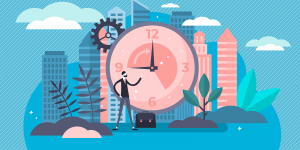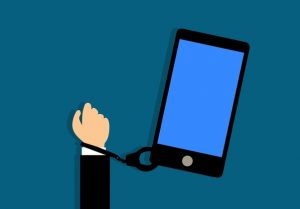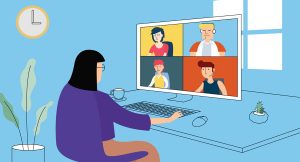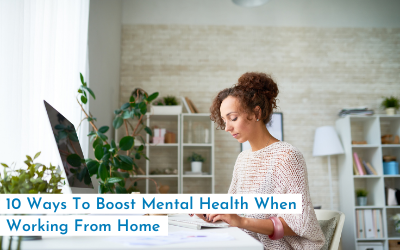‘’…. you don’t have to control your thoughts,
you just have to stop letting them control you…’’
It might have begun as somewhat of a curiosity however working from home for significant stretches of time can begin to influence our emotional well-being. Similarly, as it is critical to take care of actual wellbeing during the episode of Novel Coronavirus, it’s additionally essential to keep on top of how you are feeling. In contrast to a cold or a messed-up leg, the side effects of pressure, nervousness, discouragement, and other psychological sicknesses can be covered up or erroneously rationalized. Giving applicable assets and building a culture that focuses on mental prosperity helps workers who are battling have a sense of security and urges everybody to improve their emotional well-being.
Table of Contents
- 10 Ways To Boost Mental Health When Working From Home
- 1. Not become a Solitary Reaper
- 2. Plan out the day Properly
- 3. Work time is not Equal to Home time
- 4. Take Regular Breaks
- 5. Stay Active and Hydrated
- 6. Try working in proper Ventilation
- 7. Manage your inner Calm
- 8. Protect yourself from negative intentions, emotions and energy
- 9. Don’t be Addicted to Social Media
- 10. Participate actively in Virtual Meetings
- Why mental health matters for People Working from Home?
10 Ways To Boost Mental Health When Working From Home
1. Not become a Solitary Reaper
The primary stage is to keep your cool when you feel restless or forlorn. Keep in mind: if your whole organization is working distantly, they’re probably encountering a similar sort of pressure. It’s imperative to know you’re in good company. In any case, that additionally doesn’t imply that you’re continually on telephone or informing stages, since that may hamper work. Being social can likewise help you stay gainful. Plan standard 1:1s to monitor your colleagues genuinely just as expertly.
2. Plan out the day Properly

Routine and design are vital to making the isolate period decent, and that begins with your rest. Fight the temptation to hit the rest button. Examination shows that keeping schedules, yet with some variety – having various activities and undertakings at various occasions – is truly significant. Accomplish something positive with the time you saved from your drive, for example, preparing a sound lunch or going for a run. At that point work as per your own circadian rhythms.
3. Work time is not Equal to Home time

Set a daily practice as though you are going into the workplace, with a normal beginning time, and finish time, and a design for your day, with breaks and exercise planned in. This will assist you with holding a limit among work and home life, limit the chance of work meddling into your family time, and help you switch off from work by the day’s end. Making signals, for example, getting changed into your work garments toward the beginning of the day, and out toward the end, can assist with this.
4. Take Regular Breaks

Setting aside a few minutes for breaks is imperative to help oversee sensations of stress – attempt to take lunch and customary screen breaks. Give yourself an opportunity to focus on something different so you feel more engaged when you return. Indeed, even only 5 to 10 minutes of brief breaks every hour can truly help your efficiency as well. On the off chance that conceivable, set an opportunity to take a walk, run or bicycle ride for some natural air, or an espresso – simply ensure you follow social separating direction when outside your home.
5. Stay Active and Hydrated

It’s not difficult to spend your whole far-off workday on your love seat or bed, in your night wear, gazing at a screen for nine hours in a row. Yet, that is bad for your body. The means you take in an office, for example strolling to gathering spaces for gatherings, going to the restroom or down the stairs to get your lunch or in any event, strolling to a colleague’s work area can be reproduced at home think about taking “work area breaks” where you move to an alternate workspace.
6. Try working in proper Ventilation

The field of natural brain science, which investigates our relationship with our nearby environmental factors, has parts to show us being stuck inside and making an office in the home. The principal thing to consider is the place where to sit. People are more agreeable sat with our options somewhat limited and a perspective on the entryway or window. If you can discover a stay with a perspective on any sort of nature, then this can diminish circulatory strain and the course of pressure chemicals.
7. Manage your inner Calm

Dealing with your psychological wellbeing is similarly as significant after work all things considered during working hours. So, once you log off, put your telephone on ‘don’t upset’ and look for comfort in the things that make a difference to you and fulfil you. Zeroing in on a diversion, watching a film or perusing a book, settling on a telephone decision to a companion or a relative, sleeping, or preparing your number one feast. You’ve placed in a hard day in a difficult time—you have the right to be well.
8. Protect yourself from negative intentions, emotions and energy

A deadly pandemic is not sufficient to trigger nervousness and melancholy, research recommends that people working from home can be inclined to episodes of poor psychological well-being. An UN report in 2017 found that telecommuters are bound to encounter high feelings of anxiety than office laborers: messages are confounded, work seeps into everyday life and people regularly through more clock hours. If you feel restless, change to work out, perusing, tuning in to digital broadcasts, innovative pursuits, scholarly pursuits.
9. Don’t be Addicted to Social Media

It’s alright to log off. Truth be told, it’s OK to totally unplug now and again. Offer yourself that reprieve from both web-based media and work—the don’t upset capacity is there on purpose. Your work will in any case be there after you finish your feast. Use devices like Screen Time to deal with your web-based media use and be wary about phony information. Set aside the effort to search out records that help your psychological prosperity to neutralize the pressure of online media.
10. Participate actively in Virtual Meetings

A usually made wisecrack toward the beginning of the pandemic said that one thing the Covid would train us is whether each one of those gatherings might have been messages all things considered. Abundance gatherings may have been a bogeyman of the pre-COVID-19 working environment however at this moment, they’re fundamental. What’s more, not only for much-required human contact. The individual chief’s job is out of nowhere more significant than any other time in recent memory.
Why mental health matters for People Working from Home?
Numerous associations miss the mark with regards to worker wellbeing. While it’s extraordinary that most corporate projects intensely underline actual wellbeing through advantages like dental plans and doctor prescribed medication inclusion, the body is just a large portion of the condition. Our minds are similarly as pivotal to our prosperity, particularly considering the hindering impacts psychological maladjustment can have on actual wellbeing.
At the point when a worker is enduring, so tackles their job. Gloom has become the main source of inability across the globe, and it’s assessed that 172 million workdays are lost because of despondency every year. Stress, uneasiness, and other psychological well-being issues compound this issue, leaving individuals less connected with, centred, and gainful.
Taking everything into account, A ton of us are battling to pull away from Covid news via web-based media or stay social while working from home during a far-reaching far-off work test. On occasion, you simply need to twist into a ball and totally disregard work. Yet, work goes on. Keeping your psychological wellness, a need at work and limiting disengagement is currently more significant than any other time in recent memory. Fortunately, a great deal of organizations is rehearsing virtual espressos snacks, video conferencing, and predictable informing.

